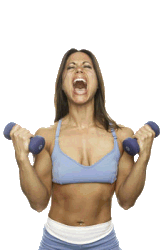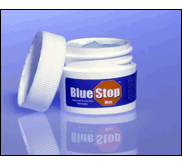14 Things to do if You Feel Tired
and Sore After Working Out
by www.SixWise.com
You've pushed yourself to the limit -- jogging, lifting,
dancing or whatever it is you do to exercise -- and have no
sooner wiped the sweat from your brow when it hits you: sore
muscles and fatigue ... the variety that make you wonder,
"Why am I doing this to myself?!"
|

It's normal to "feel the burn" during your
workout, but afterward you should feel energized --
not tired and sore.
|
What causes sore muscles and fatigue after a workout? Many
things, but often it occurs because you've exerted yourself
and your body needs time to adjust.
To be fair, muscles soreness often doesn't occur for 12 to
36 hours after a workout. This type of soreness, called delayed-onset
muscles soreness (DOMS), is more likely to happen when you've
just intensified your workout or started
a new activity. It's caused either by a buildup of energy
waste products in the muscles or microscopic tears in muscle
fibers.
With DOMS, you may think you're out of the woods, and then
be hit with muscles soreness, stiffness, weakness and fatigue.
Meanwhile, energy-wise it's possible to still be "feeling
the burn" from your workout for a day or more afterward.
What causes this may actually be your brain -- not your muscles.
Researchers from the University of Cape Town in South Africa
found that prolonged exercise increases blood levels of interleukin-6
(IL-6), a molecule that makes people feel tired, 60 to 100
times higher than normal.
This may, in fact, be your body's way of telling you to slow
down before any muscle damage occurs.
What to do so You Feel Great After Your Workout
|

BlueStop MAX Arthritis Pain Gel can ease athletic pain
and sore muscles in minutes. Find
out more now ... !
|
Exercise should, technically, make you feel more energized,
toned and fit -- not tired or sore. And while a little bit
of fatigue and aches are normal, if you feel awful after you
workout it's a surefire way to quickly give up your routine.
Here are 14
simple tips that you can use before, during and after
your next workout to make sure you feel the way exercise is
intended to make you feel: great!
-
Make sure your body has fuel. Eating a small
snack about an hour before your workout may help give
you energy.
-
Get enough sleep. If your body is truly tried, your
workout will only exacerbate this feeling.
-
When you start a new exercise routine, or increase intensity/duration,
do so gradually.
-
Take a few minutes to warm-up before your workout.
-
After you workout, stretch
your muscles.
-
Don't exhaust yourself. If you're feeling completely
out of breath or extremely fatigued, decrease the intensity
of your workout.
-
Give yourself time to recover. Avoid training the same
muscle groups two days in a row.
-
Drink plenty of water. Dehydration
can lead to fatigue.
-
Eat something after your workout. Eating a mixture of
protein and complex carbs within 90 minutes of working
out will help repair your muscles and give you energy.
Some great snack ideas include nuts and fruit, yogurt
or cheese and whole-grain crackers or a tuna sandwich
on whole-wheat bread.
If you've already worked out and now feel sore, here's what
you can do to soothe your achy muscles:
-
Massage the area.
-
Apply a cold pack to the area.
-
Use BlueStop
MAX Arthritis Pain Gel, a natural, proven topical
gel that will relieve your pain in minutes.
-
Give it time. Muscle soreness should go away on its
own in a few days.
-
Do some low-impact exercise. This increases blood
flow to your muscles and can help to relieve soreness.
Recommended Reading
The
Health Benefits of Dancing -- Including Specific Benefits
of Different Dances
The
7 (Honest) Facts You Should Know About Losing Thigh Fat, Gut
Fat, and Fat in Other "Problem" Areas
Sources
NewScientist.com
About.com:
Sports Medicine